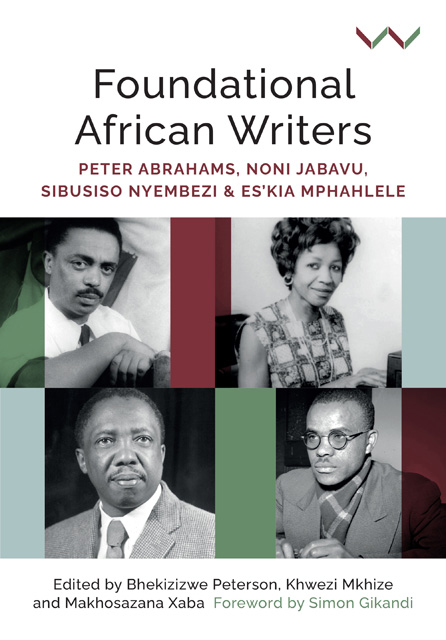Book contents
- Frontmatter
- Contents
- List of illustrations
- Foreword
- Acknowledgements
- Tribute to Professor Bhekizizwe Peterson
- Introduction
- Part I Remapping and Rereading African Literature and Cultural Production
- Part II South Africa and Fugitive Imaginaries
- Part III In the Eye of the Short Century: Diaspora and Pan-Africanism Reconsidered
- Contributors
- Index
1 - Foundational Writers and the Making of African Literary Genealogy: Es’kia Mphahlele and Peter Abrahams
Published online by Cambridge University Press: 01 September 2022
- Frontmatter
- Contents
- List of illustrations
- Foreword
- Acknowledgements
- Tribute to Professor Bhekizizwe Peterson
- Introduction
- Part I Remapping and Rereading African Literature and Cultural Production
- Part II South Africa and Fugitive Imaginaries
- Part III In the Eye of the Short Century: Diaspora and Pan-Africanism Reconsidered
- Contributors
- Index
Summary
This chapter sets out to make a case in defence of foundational writers in Africa by making general reference to the works of two South African writers, Es’kia Mphahlele and Peter Abrahams. First, I make the point that far from being narrowly constrained by the politics of their time, at a literary level, foundational writers in general not only referenced a local resource base akin to them, but perhaps more importantly gestured elsewhere for new literary templates forged in similar political contexts. I argue that these writers were involved in a layered cross-referencing which amounted to a deliberate attempt at building a literary genealogy. In this project of archive-building, they were equally adept at positioning themselves as cultural brokers of their world and of the Western world to their people. They saw themselves, therefore, as critical translators of a history that was fading fast before their eyes, but also one they were involved in shaping. Second, I argue that the foundational writers, broadly speaking, were acutely aware of the overlapping territories they were grappling with. As a result, their works were steeped in the broad intellectual and political traditions of their time, such as the Pan-Africanist and African American civil rights movements. The realisation that their local struggles were inextricably linked to other struggles for human freedom elsewhere shaped the broad poetics underpinning their writing. In other words, the world was their stage. Third, I argue that it was this close affinity with the local and international struggles of their time that allowed them to anticipate, by decades, discourses around female and gender representation, for example, that only became prominent in the 1980s and 1990s, especially in African fiction, and more importantly only amongst women writers. Finally, I argue that their involvement with Pan-Africanist ideologies and related forms of nationalism also gave them a keen understanding of colonial statecraft and its workings, especially its role in weakening, or aiding the total collapse of, traditional authorities in Africa, often with devastating consequences for the postcolonial state. The roots of unhedged power in the post-independent states in Africa, I suggest, may well be traced back to the trappings of rampant authority that colonialism authorised. My overall argument is that it is precisely these indelible footprints that compel attention to foundational writers, in order to surface their continued relevance, which their detractors have sought to deny.
- Type
- Chapter
- Information
- Foundational African WritersPeter Abrahams, Noni Jabavu, Sibusiso Nyembezi and Es'kia Mphahlele, pp. 27 - 52Publisher: Wits University PressPrint publication year: 2022



